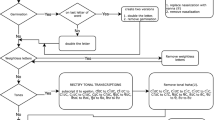Abstract
Scansion is the activity of determining the patterns that give verses their poetic rhythm. In Portuguese, this means discovering the number of syllables that the verses in a poem have and fitting all verses to this measure, while attempting to pronounce syllables so that an adequate stress pattern is produced. This article presents Aoidos, a rule-based system that takes a poem written in the Portuguese language and performs scansion automatically, further providing an analysis of rhymes. The system works by making a phonetic transcription of a poem, determining the number of poetic syllables that the verses in the poem should have, fitting all the verses according to this measure and looking for verses that rhyme. Experiments show that the system attains a high accuracy rate (above 98%).
Access this chapter
Tax calculation will be finalised at checkout
Purchases are for personal use only
Similar content being viewed by others
References
Moretti, F.: Distant Reading. Verso Books, New York (2013)
Reddy, S., Knight, K.: Unsupervised discovery of rhyme schemes. In: Proceedings of the 49th Annual Meeting of the Association for Computational Linguistics: Human Language Technologies: short papers, vol. 2, pp. 77–82. Association for Computational Linguistics (2011)
Hayward, M.: Analysis of a corpus of poetry by a connectionist model of poetic meter. Poetics 24, 1–11 (1996)
Plamondon, M.R.: Virtual verse analysis: analysing patterns in poetry. Literary Linguist. Comput. 21, 127–141 (2006)
Agirrezabal, M., Arrieta, B., Astigarraga, A., Hulden, M.: ZeuScansion: a tool for scansion of English poetry. In: Proceedings of the 11th International Conference on Finite State Methods and Natural Language Processing, St Andrews, Scotland, pp. 18–24 (2013)
Hammond, M.: Calculating syllable count automatically from fixed-meter poetry in English and Welsh. Literary Linguist. Comput. 29, 218–233 (2014)
Papakitsos, E.C.: Computerized scansion of Ancient Greek hexameter. Literary Linguist. Comput. 26(1), 57–69 (2010)
Ibrahim, R., Plecháč, P.: Towards the automatic analysis of Czech verse. In: Formal Methods in Poetics, pp. 295–305. RAM, Lüdenscheid (2011)
Almuhareb, A., Alkharashi, I., AL Saud, L., Altuwaijri, H.: Recognition of classical Arabic poems. In: Proceedings of the Workshop on Computational Linguistics for Literature, Atlanta, Georgia, Association for Computational Linguistics, pp. 9–16 (2013)
Delmonte, R.: A computational approach to poetic structure, rhythm and rhyme. In: Proceedings of the First Italian Conference on Computational Linguistics CLiC-it 2014 and of the Fourth International Workshop EVALITA 2014, pp. 144–150. Pisa University Press (2014)
Rainsford, T., Scrivner, O.: Metrical annotation for a verse treebank. In: The 13th International Workshop on Treebanks and Linguistic Theories (TLT13), pp. 149–159 (2014)
Bobenhausen, K., Hammerich, B.: Métrique littéraire, métrique linguistique et métrique algorithmique de l’allemand mises en jeu dans le programme metricalizer. Langages 3, 67–88 (2015)
Delente, E., Renault, R.: Traitement automatique des formes métriques des textes versifiés. In: 22ème Traitement Automatique des Langues Naturelles (2015)
Navarro, B., Ribes-Lafoz, M., Sánchez, N.: Metrical annotation of a large corpus of Spanish sonnets: representation, scansion and evaluation. In: Language Resources and Evaluation Conference (2016)
de Araújo, P.A.M.: Classificação de poemas e sugestão das palavras finais dos versos. Universidade Té cnica de Lisboa (2004)
de Araújo, P.A.M., Mamede, N.J.: Classificador de poemas. In: Conferência Científica e Tecnológica em Engenharia (2002)
Oliviera, L.C., Viana, M., Trancoso, I.M.: A rule-based text-to-speech system for Portuguese. In: 1992 IEEE International Conference on Acoustics, Speech, and Signal Processing, ICASSP 1992, vol. 2, pp. 73–76. IEEE (1992)
Braga, D., Coelho, L., Resende Jr., F.G.V.: A rule-based grapheme-to-phone converter for TTS systems in European Portuguese. In: 2006 International Telecommunications Symposium, pp. 328–333. IEEE (2006)
Neto, N., Rocha, W., Sousa, G.: An open-source rule-based syllabification tool for Brazilian Portuguese. J. Braz. Comput. Soc. 21, 1–10 (2015)
Couto, I., Neto, N., Tadaiesky, V., Klautau, A., Maia, R.: An open source HMM-based text-to-speech system for Brazilian Portuguese. In: 7th International Telecommunications Symposium (2010)
Acknowledgments
We would like to thank Isabela M. B. Sandoval, Lívia Guimarães and Samanta Maia for their contribution in the experiments. This work was partially supported by the Brazilian National Council for Scientific and Technological Development (CNPq) and by the Santa Catarina Foundation for the Support of Research and Innovation (FAPESC).
Author information
Authors and Affiliations
Corresponding author
Editor information
Editors and Affiliations
Rights and permissions
Copyright information
© 2018 Springer International Publishing AG, part of Springer Nature
About this paper
Cite this paper
Mittmann, A., von Wangenheim, A., dos Santos, A.L. (2018). Aoidos: A System for the Automatic Scansion of Poetry Written in Portuguese. In: Gelbukh, A. (eds) Computational Linguistics and Intelligent Text Processing. CICLing 2016. Lecture Notes in Computer Science(), vol 9624. Springer, Cham. https://doi.org/10.1007/978-3-319-75487-1_46
Download citation
DOI: https://doi.org/10.1007/978-3-319-75487-1_46
Published:
Publisher Name: Springer, Cham
Print ISBN: 978-3-319-75486-4
Online ISBN: 978-3-319-75487-1
eBook Packages: Computer ScienceComputer Science (R0)




